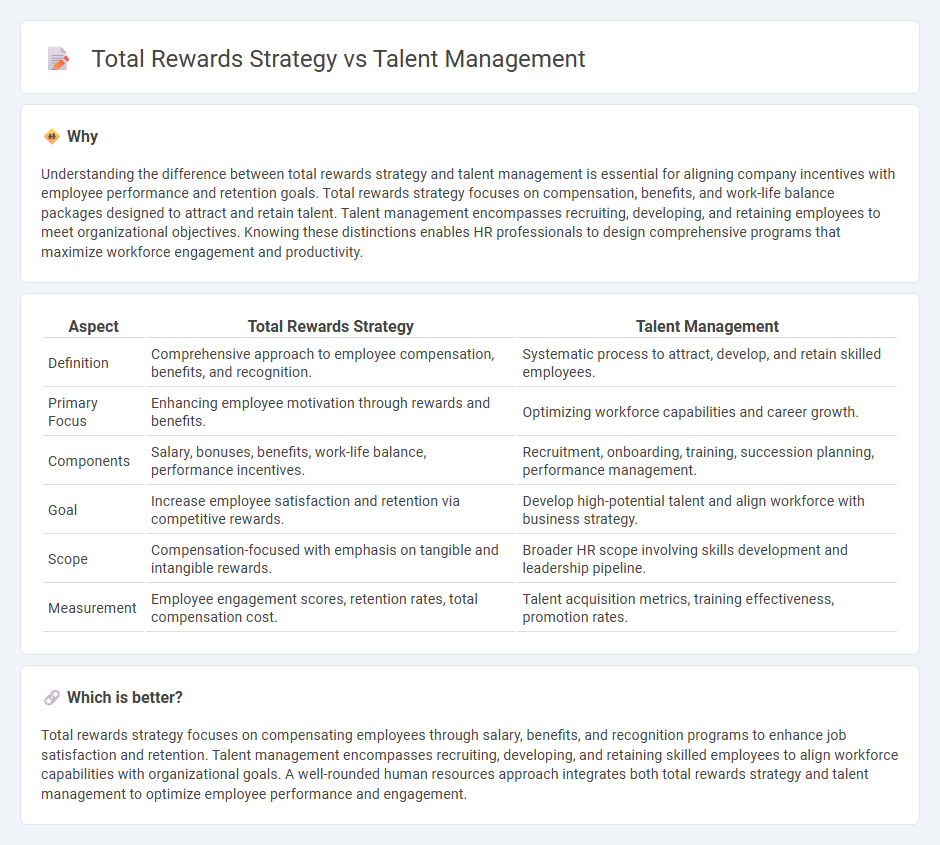
Total rewards strategy focuses on designing comprehensive compensation packages, including salary, benefits, and incentives, to attract and retain top talent. Talent management emphasizes recruiting, developing, and retaining employees to align their skills and performance with organizational goals. Explore how integrating total rewards and talent management drives workforce engagement and business success.
Why it is important
Understanding the difference between total rewards strategy and talent management is essential for aligning company incentives with employee performance and retention goals. Total rewards strategy focuses on compensation, benefits, and work-life balance packages designed to attract and retain talent. Talent management encompasses recruiting, developing, and retaining employees to meet organizational objectives. Knowing these distinctions enables HR professionals to design comprehensive programs that maximize workforce engagement and productivity.
Comparison Table
| Aspect | Total Rewards Strategy | Talent Management |
|---|---|---|
| Definition | Comprehensive approach to employee compensation, benefits, and recognition. | Systematic process to attract, develop, and retain skilled employees. |
| Primary Focus | Enhancing employee motivation through rewards and benefits. | Optimizing workforce capabilities and career growth. |
| Components | Salary, bonuses, benefits, work-life balance, performance incentives. | Recruitment, onboarding, training, succession planning, performance management. |
| Goal | Increase employee satisfaction and retention via competitive rewards. | Develop high-potential talent and align workforce with business strategy. |
| Scope | Compensation-focused with emphasis on tangible and intangible rewards. | Broader HR scope involving skills development and leadership pipeline. |
| Measurement | Employee engagement scores, retention rates, total compensation cost. | Talent acquisition metrics, training effectiveness, promotion rates. |
Which is better?
Total rewards strategy focuses on compensating employees through salary, benefits, and recognition programs to enhance job satisfaction and retention. Talent management encompasses recruiting, developing, and retaining skilled employees to align workforce capabilities with organizational goals. A well-rounded human resources approach integrates both total rewards strategy and talent management to optimize employee performance and engagement.
Connection
A total rewards strategy integrates compensation, benefits, and recognition to attract and retain top talent, directly impacting talent management effectiveness. By aligning rewards with employee performance and career development, organizations enhance engagement and reduce turnover. Strategic total rewards create a motivated workforce, enabling talent management to nurture skills and achieve business objectives.
Key Terms
**Talent Management:**
Talent management centers on identifying, developing, and retaining high-potential employees through targeted training, career pathing, and performance management systems. It aims to align employee growth with organizational goals, enhancing workforce capabilities and productivity. Explore how effective talent management can transform your business by unlocking employee potential.
Succession Planning
Talent management centers on identifying and developing high-potential employees to ensure leadership continuity through structured succession planning. Total rewards strategy complements this by offering competitive compensation, benefits, and recognition programs that motivate key talent to remain and grow within the organization. Explore how integrating these approaches optimizes workforce stability and drives long-term business success.
Workforce Planning
Talent management emphasizes identifying and developing the right skills to meet future organizational needs, while total rewards strategy focuses on designing compensation, benefits, and recognition programs to attract and retain talent. Workforce planning integrates both approaches by forecasting talent requirements and aligning them with competitive rewards to ensure employee engagement and organizational agility. Explore our comprehensive insights on aligning talent management with total rewards for effective workforce planning.
Source and External Links
What Is Talent Management? A Guide for 2025 - NetSuite - Talent management is a continuous process of evaluating, attracting, hiring, managing, and developing the workforce to meet business needs and close skill gaps through structured planning, onboarding, training, and performance assessment.
Talent Management: The Complete Guide - AIHR - Talent management encompasses all HR strategies and processes--such as recruitment, learning and development, performance management, and employee experience--to attract, motivate, develop, and retain high-performing employees and drive organizational success.
Talent Management - OPM - Talent management ensures organizations place the right people with the right skills in the right roles at the right time, using systematic strategies to attract, develop, and retain quality talent while closing skills gaps and supporting mission achievement.
 dowidth.com
dowidth.com